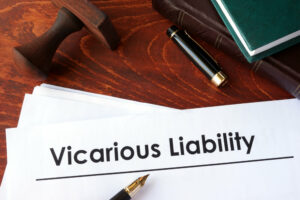
The term vicarious relates to an ability to feel or experience something through the actions of another. Specialists often advise parents not to live their dreams vicariously through their children and let them develop their tastes and activities. But in legal terms, vicarious liability is held by someone in charge of another person, such as the employer. Under certain conditions in New Jersey, the employer can be held responsible for their employee’s actions if that employee causes harm to someone.
Legal Principles and Terminology for Vicarious Liability in New Jersey
Two Latin phrases are used when talking about vicarious liability. The first is qui facit per alium facit per se. which translates to “He who acts through another does the act himself.” The second is respondeat superior, which means,” Let the master answer.” This means a superior is responsible for the actions of the people under them.
There are several kinds of vicarious liability situations, and the following vocabulary will be helpful to have a clear understanding of them.
- The principal is the legal representative of the actions committed by the agent. This can be a person, employer, supervisor, or anyone in a position of authority over the agent.
- The agent is the person who caused harm to another person while working under the principal. Usually, this person is an employee, but in other kinds of vicarious liability, it can be a child to a parent or an independent contractor to a property owner.
- The plaintiff is the person who was injured by the actions of the agent.
- The scope of employment is the duties and actions the agent performs that are part of the agent’s job. The employee acted within the constructs of their position in a professional relationship between them and their superior when the injury occurred.
Defining Employee Responsibilities and Vicarious Liability
If the incident occurred while the agent acted on the duties they were required to perform based on their job title and related responsibilities, they are within the scope of employment. The employee’s intent and conduct must be directly related to their work. The incident must have occurred within the confines of the employee’s duties.
For example, Roychester is a driver for Crystal’s Cutie Pies and makes deliveries throughout Mercer and the neighboring counties. Last week, while driving down Scotch Road, he accidentally failed to stop at a red light and hit a cyclist. He acted within the scope of his employment because he was delivering pies in the company truck per his manager’s instructions.
But if Roychester drives to his girlfriend’s house in the company truck to have lunch and is in an accident, that is not within the scope of his employment. He isn’t making deliveries and may not even have permission from his manager for the diversion. He is not on his delivery route and, therefore, is not within the scope of his employment.
Distinguishing Vicarious Liability from Negligent Supervision
In vicarious liability cases, the employer may not have acted inappropriately at all, whereas negligent supervision requires that the supervisor was lax in their duties, and the problem could have been avoided had they taken more care. The major difference between them is that vicarious liability doesn’t blame the employer for the accident but makes them responsible for what their employee did. In contrast, negligent supervision occurs when an employer’s inability to supervise their employees appropriately results in harm.
Enhancing Recovery Options Through Vicarious Liability in NJ Personal Injury Cases
Vicarious liability permits a plaintiff to seek other sources of damages, such as an employer’s insurance policy or a major corporation whose pockets are significantly deeper than the employee who caused the accident. For example, if a doctor made a mistake during surgery, the affected patient could sue the hospital for vicarious liability.
Vicarious Liability Principles of Accountability
There must be a master-servant relationship between the agent and the principal. They are not literally master and servant, but the principle of respondeat superior requires a supervisor versus subordinate relationship. The other principle is qui facit per alium facit per se, which obligates the “master” to take responsibility for the subordinate’s actions.
Key Elements in NJ Vicarious Liability Claims
First, the relationship between the subordinate and employer must be established. That relationship must exist when the agent commits the act. Secondly, if the case involves an employee-employer relationship, the actions taken by the agent must fall under their scope of employment. Lastly, it must be established that the employer has control over the employee, be it directly or indirectly.
Common Scenarios that Exemplify Vicarious Liability
Employer-Employee: Jordan works at the Whole Foods store on Route 1 in Princeton. He is responsible for product displays and general cleaning of the aisles. He noticed a small leak coming from the dairy refrigerators and made a mental note to clean it up later. Before he can get to it, Mrs. Pratt, from down the street, slips on the puddle of water and is seriously injured. She can file a lawsuit against the store and the Whole Foods Company.
Parent-Child: Minor children cannot be held legally responsible in civil cases. While walking home from school, Honey and June decided it would be fun to throw rocks at passing cars. When one of the projectiles cracked Miss Penny’s windshield, she panicked, causing her to crash into a telephone pole. The girls’ parents were the focus of a lawsuit claiming damages for Miss Penny’s injuries, lost property, and pain and suffering.

Principal-Agent (Not employee-related): Hannah lent her brother her car so he could stop by her office to pick up some files while she was home recovering from surgery. She asked him to pick up her dry cleaning and stop by the local sandwich shop for lunch. While dutifully running these errands, her brother ran into two pedestrians as they were crossing the road. He was texting at the time and hadn’t seen them until it was too late. Hannah is the car owner, and her brother was running errands for her. She can be held vicariously liable.
Contact Our Hamilton NJ Vicarious Liability Claim Lawyers for Assistance
Suffering an injury because of someone’s negligence can leave you injured, stressed, and in debt. Missed work, medical bills, and time to recuperate can take a toll on your physical, mental, and financial well-being. Our legal team in Hamilton, New Jersey can determine who is responsible for your injuries and whether vicarious liability applies to your situation. Whether we are negotiating a settlement on your behalf or going to court to protect your right to seek compensation for your damages, our long-practiced personal injury attorneys at Cohen & Riechelson are ready to work for you.
You deserve compensation for your medical bills and other expenses. We have proudly and successfully represented hundreds of clients with a variety of personal injury cases in Burlington, Hopewell, Lawrence, Willingboro, Princeton, and Ewing, and we look forward to helping you. Call (609) 528-2976 for more information. For the majority of personal injury cases, you don’t pay us unless we win. Fill out our contact form to schedule your free consultation.

